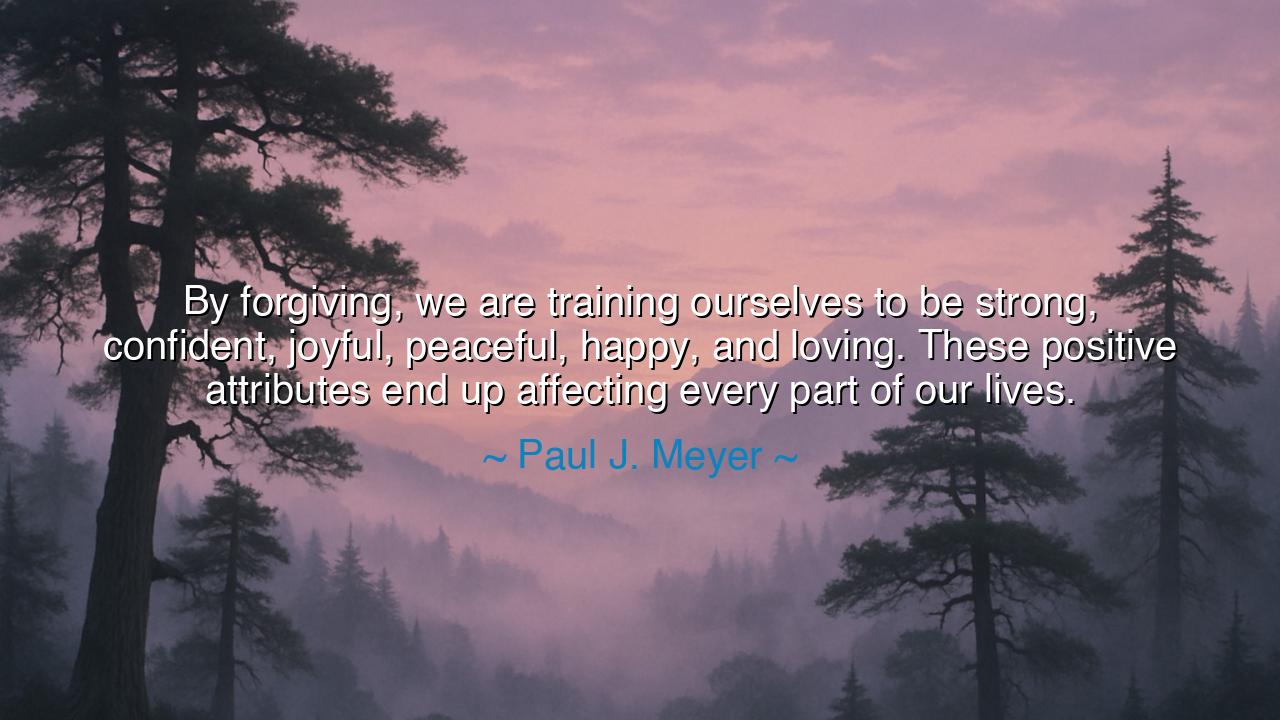
By forgiving, we are training ourselves to be strong, confident
By forgiving, we are training ourselves to be strong, confident, joyful, peaceful, happy, and loving. These positive attributes end up affecting every part of our lives.






When Paul J. Meyer declared, “By forgiving, we are training ourselves to be strong, confident, joyful, peaceful, happy, and loving. These positive attributes end up affecting every part of our lives,” he was not uttering a mere reflection, but unveiling an eternal law of the human spirit. His words proclaim that forgiveness is not weakness, but the highest form of strength. It is an act that disciplines the heart, shaping it into a vessel of light. In this teaching, forgiveness is no passive surrender — it is a training, a daily exercise that fortifies the soul in courage and fills it with peace.
The ancients knew well that harboring resentment is like drinking poison while hoping another will die. The Stoics, such as Marcus Aurelius, taught that the bitterness we carry within ourselves chains us more tightly than any prison of stone. By practicing forgiveness, a man breaks his own shackles, reclaiming freedom over his spirit. Meyer’s words remind us that each act of forgiveness is a rehearsal for greatness, a honing of virtues that shape every corner of our existence.
Consider the life of Nelson Mandela, who endured decades in prison under the cruel shadow of apartheid. When at last he was free, he had every reason to harbor vengeance, yet he chose forgiveness. In that choice, he not only reclaimed his own peace but transformed a nation. His strength, his confidence, his joy — all were fruits of a spirit trained by the power of mercy. His life is living proof of Meyer’s wisdom: that forgiveness cultivates attributes that ripple outward, touching not only the forgiver but all who cross their path.
We must also remember that forgiveness is not the denial of wrongs. It does not erase memory or excuse injustice. Instead, it is a discipline of the soul, saying: I will not let anger own me, I will not let resentment dictate my fate. In this act, the forgiver becomes sovereign over his emotions, redirecting the energy of bitterness into the light of peace and love. It is through this transformation that forgiveness becomes a fountain of joy and confidence.
The lesson here is clear and noble: to refuse forgiveness is to remain bound to the past; to practice it is to step into freedom. Each time we release resentment, we strengthen the muscles of the heart. Just as the warrior trains his body through trial, so the wise train their spirit through mercy. Over time, this discipline grows into a reservoir of inner power, affecting relationships, health, and destiny itself.
In practice, this means beginning with the small grievances. When wronged in word or deed, pause and choose not to respond with bitterness. Speak gently where anger urges harshness. Offer compassion where pride demands retaliation. And for deeper wounds, allow time and patience to guide you, but do not abandon the path of forgiveness, for it is the only path that leads to peace.
Therefore, remember Paul J. Meyer’s words: by forgiving, we are training ourselves. Each act of mercy is a step on the path to strength, each release of bitterness a seed of joy. Live in this discipline, and your life will become radiant with confidence, serene with peace, and overflowing with love. And when your days are remembered, it will not be the wrongs you endured that define you, but the greatness of your spirit in forgiving them.






LT43-8.1 Lam truong
This perspective highlights the ripple effect of positive emotions generated through forgiveness. But it raises questions: can forgiveness coexist with accountability and justice, or does it risk excusing harmful behavior? How do we ensure that forgiving someone enhances our own life without compromising moral standards? I’d like a perspective on how individuals can navigate the tension between forgiveness, self-respect, and maintaining healthy boundaries in personal and professional relationships.
PTNguyen Phuoc Toan
I find this statement thought-provoking because it frames forgiveness as an active skill rather than a passive act. Does practicing forgiveness change the way we interact with others beyond personal growth, potentially improving relationships and social harmony? I’d like a discussion on how forgiveness can be systematically cultivated, whether through mindfulness, therapy, or other methods, and how it can affect mental, emotional, and even physical health.
NNNo Name
Reading this, I feel both inspired and challenged. Forgiveness is often easier said than done, especially in cases of severe betrayal or trauma. How can individuals train themselves to forgive without suppressing legitimate emotions or setting boundaries? I’d like insights on balancing forgiveness with self-protection, and whether cultivating forgiveness requires formal practice, reflection, or support from others to achieve lasting personal growth.
FTFT TBQ
This quote makes me reflect on the transformative power of forgiveness. Can learning to forgive truly cultivate inner strength and joy even in deeply hurtful situations? I wonder how long it takes for forgiveness to produce these positive changes and whether the act of forgiving is more beneficial for the forgiver than the forgiven. I’d like a perspective on practical strategies for integrating forgiveness into daily life to foster emotional resilience and overall well-being.